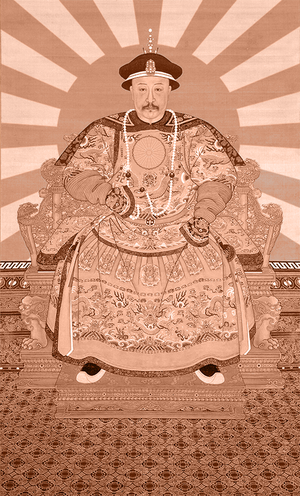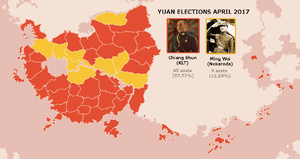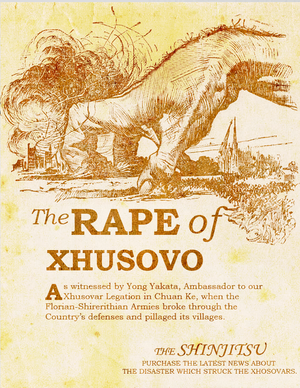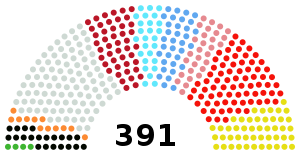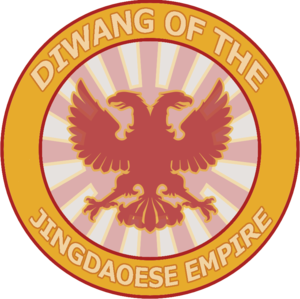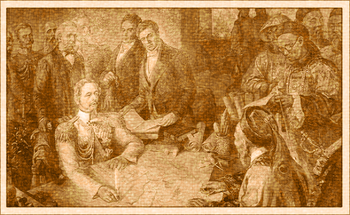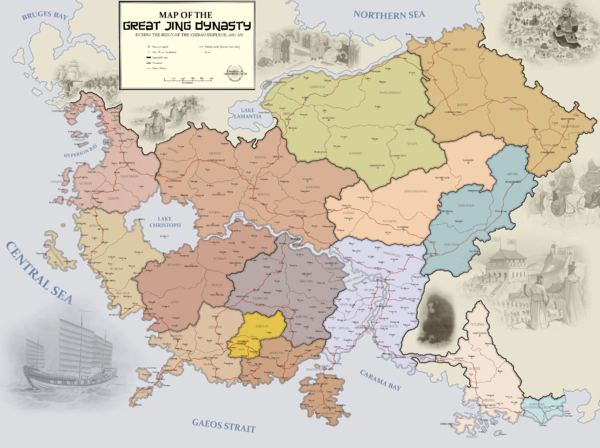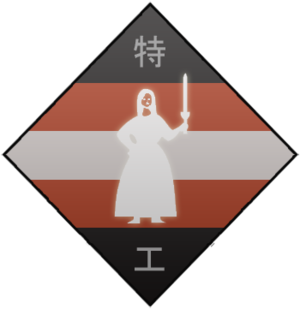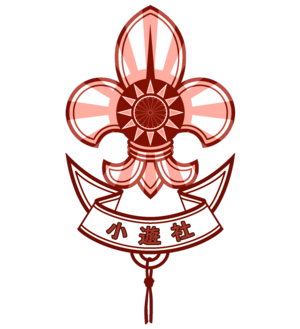Great Jing Dynasty: Difference between revisions
No edit summary |
|||
| (3 intermediate revisions by 2 users not shown) | |||
| Line 5: | Line 5: | ||
|flag1=[[File:Flag ARSE.png|20px]] | |flag1=[[File:Flag ARSE.png|20px]] | ||
|nation1=[[Jierdai Dynasty]] | |nation1=[[Jierdai Dynasty]] | ||
|years=1623 - | |years=1623 - 1700 | ||
|flag2= | |flag2= [[File:Flag Jingdaoese community.png|20px]] | ||
|nation2= | |nation2=[[Jingdaoese Community|Jingdaoese Diwangate]] | ||
|commonname = Jingdao | |commonname = Jingdao | ||
|flag = File:Flag Jingdao 2.png | |flag = File:Flag Jingdao 2.png | ||
| Line 24: | Line 24: | ||
|govtype = Absolutist theocratic monarchy | |govtype = Absolutist theocratic monarchy | ||
|headofstatetitle = [[Heavenly Light]] | |headofstatetitle = [[Heavenly Light]] | ||
|headofstate = [[ | |headofstate = [[Xinshi Emperor]] | ||
|headofgovernmenttitle = [[Diwang]] <small>(Head of the Grand Secretariat)</small> | |headofgovernmenttitle = [[Diwang]] <small>(Head of the Grand Secretariat)</small> | ||
|headofgovernment = [[Jin San]] | |headofgovernment = [[Jin San]] | ||
| Line 250: | Line 250: | ||
This division left Kildare in a vulnerable situation when the Jingdaoese started taking over the government and eventually destroyed the last remnants of the ''Later Jierdai''. Taking up a role as mediator and keeper of the peace, wit placed itself in a very favourable power position. | This division left Kildare in a vulnerable situation when the Jingdaoese started taking over the government and eventually destroyed the last remnants of the ''Later Jierdai''. Taking up a role as mediator and keeper of the peace, wit placed itself in a very favourable power position. | ||
This was clearly witnessed when looking to the numbers: while the Kildari still made up a majority (52,67%) in the 1670's, it was the largest minority, the Jingdaoese (21,24%), which governed the lands. | This was clearly witnessed when looking to the numbers: while the Kildari still made up a majority (52,67%) in the 1670's, it was the largest minority, the Jingdaoese (21,24%), which governed the lands. In 1698 AN, the Jing made up 28,11% of the total population, while the Kildarian ethnicities were slowly losing their majority share with 'only' 50,12%. | ||
The third largest group, the Batavians (14,03%), also made up a very diverse people, as they descend from several waves of immigrants: some migrated to Kildare long before the establishment of the ''Great Jing'', others followed in later immigration waves. The first migration wave took place under the reign of the [[Dashi Emperor]] as he evacuated most of Batavia. A second, smaller wave took place during the reign of the [[Chidao Emperor]] as the [[Kingdom of Batavia]] gained independence and some groups desired to remain under His government. | The third largest group, the Batavians (14,03% in 1570's, while making up only 9,63% in 1698 AN), also made up a very diverse people, as they descend from several waves of immigrants: some migrated to Kildare long before the establishment of the ''Great Jing'', others followed in later immigration waves. The first migration wave took place under the reign of the [[Dashi Emperor]] as he evacuated most of Batavia. A second, smaller wave took place during the reign of the [[Chidao Emperor]] as the [[Kingdom of Batavia]] gained independence and some groups desired to remain under His government. | ||
The Empire witnessed a stable growth, after the [[Obedience Destruction]], thanks to a series of programs like the [[Zhengbing Programme]] which heavily promoted the adoption and integration of foreign elements in Jingdaoese society. The relative peace and stability of the Chidao era also led to an annual population growth of around 1,5%-2% a year. This trend ceased with the [[1690 recession]] and slowed down further growth. | The Empire witnessed a stable growth, after the [[Obedience Destruction]], thanks to a series of programs like the [[Zhengbing Programme]] which heavily promoted the adoption and integration of foreign elements in Jingdaoese society. The relative peace and stability of the Chidao era also led to an annual population growth of around 1,5%-2% a year. This trend ceased with the [[1690 recession]] and slowed down further growth. | ||
| Line 474: | Line 474: | ||
The subjugation of the region by Kaiser [[Gaelen I]] of [[Shireroth]] and the establishment of the [[Jierdai Dynasty]] led to a sharp rise of Cedrists among the population. Mass conversions followed suit, not always sanctioned by Shirekeep but enforced by local nobility who hoped to get in good graces with their new overlords. Overeager zealots from both side increasingly came into conflict with each other. The situation deteriorated further, until [[Kaiser Meskan I]] reconfirmed the region's religious freedom in 1584 AN. | The subjugation of the region by Kaiser [[Gaelen I]] of [[Shireroth]] and the establishment of the [[Jierdai Dynasty]] led to a sharp rise of Cedrists among the population. Mass conversions followed suit, not always sanctioned by Shirekeep but enforced by local nobility who hoped to get in good graces with their new overlords. Overeager zealots from both side increasingly came into conflict with each other. The situation deteriorated further, until [[Kaiser Meskan I]] reconfirmed the region's religious freedom in 1584 AN. | ||
[[File:Daocheng shrine 1693.png|thumb|left|A shrine in Daocheng during the winter months. Shrines and temples in similar style were constructed across the nation to replace prior Apollonian architecture. Some temples, churches and catodrals were simply rebuilt or received minor cosmetic changes. A room with a portrait of the living Heavenly Light is always located in the central prayer room.]] | |||
During the Middle Jierdai Dynasty (1533 - 1604 AN) religious peace slowly returned. The ''Dutches'' (Dukes) of Jierdai enjoyed a period of increased liberty from central authorities and spread their wings. A renaissance of old Apollonian culture, including Soloralism, happened and the popularity of the Cedrist god Sakat grew among the scholars and elite. A mixture of Soloralist and Cedrist views and traditions became more common. | During the Middle Jierdai Dynasty (1533 - 1604 AN) religious peace slowly returned. The ''Dutches'' (Dukes) of Jierdai enjoyed a period of increased liberty from central authorities and spread their wings. A renaissance of old Apollonian culture, including Soloralism, happened and the popularity of the Cedrist god Sakat grew among the scholars and elite. A mixture of Soloralist and Cedrist views and traditions became more common. | ||
Latest revision as of 15:37, 3 December 2021
| Tianchao Jingdao Empire of the Great Jing | |||
| |||
| Motto: Sensible and Ruthless | |||
| Anthem: Alte Kameraden | |||
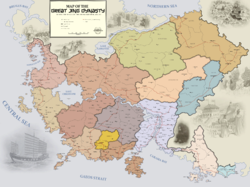
| |||
| Map versions | As part of Shireroth (Kildare): 1.5.0 - 15.4.6 | ||
| Capital | Daocheng | ||
| Largest city | Chuanliyang, Sizhecheng, Tianhoucheng, Xiacheng, Zhuaricheng | ||
| Official language(s) | Official language: Jingdaoese Other languages: | ||
| Official religion(s) | Tianchaodao | ||
| Demonym | Jingdaoese | ||
| - Adjective | Jingdaoese | ||
| Government | Absolutist theocratic monarchy | ||
| - Heavenly Light | Xinshi Emperor | ||
| - Diwang (Head of the Grand Secretariat) | Jin San | ||
| - Legislature | Chao Suweiai | ||
| Establishment | Grand Duchy of Southbatavia: 01.06.1583 (December 11st 2011) (155 Norton years ago) | ||
| Area | NA | ||
| Population | ~318,382,960 (01.01.1672) | ||
| Currency | Kala | ||
| Abbreviation | DAO | ||
| Mains electricity | |||
| Driving side | Right | ||
| Track gauge | |||
| Calendar | |||
| Time zone(s) | CMT-3 | ||
| National website | jingdao.nl | ||
| National forum | Forum (1) | ||
| National animal | Two-headed Eagle | ||
| National food | Safir wings with cabbage | ||
| National drink | Imperial white tea | ||
| National tree | Holy Ginseng Tree | ||
The Jingdaoese Empire, formerly known as the Jingdaoese-Apollonian Union, and in ancient times referred to as Empire of Jingdao and Southbatavia, is an Anglo-Dutch micronation. The official name of the empire is Tianchao Jingdao which translates from the original Jingdaoese to English as Celestial Empire of the Pure Path. This official name is mentioned in the Tianchaodao. Other - less frequently used names - are the Empire of the Pure Path and - when referring to the ruling dynasty the Empire of the Great Jing.
Through its long history, the Empire has seen much violence, destruction and mass immigrations, which often had religious and cultural causes. The region populated by the Jingdaoese has, since its establishment, been changed twice: the first time they migrated from Cibola to the former Antican Isles and later the centre of political power moved to the west (after Kildare was annexed into Jingdao). Instead of collapsing, these disasters proved to be omens for a rebirth and strengthening of the Nation its power. While to the outside world, the Empire's culture seems limited to an Asian-styled culture, but in reality it has a diverse mix of European (mainly German) and Asian cultures which have influenced the daily life of its citizens and the Heavenly Court and even Jingdaoese can still be surprised when visiting another province or State.
An important element of its society is the devotion towards the Emperor, of which some are called Heavenly Light if they have proven themselves to be reincarnations of one of the Goddess Sisera or Ancient Prophets. Depending on the era, the power and influence of the Emperor has differed, but never truly diminished. Even after the Destruction by the Obedience Machine in 1631 AN, the Emperor received tremendous political power, despite the establishment of the Imperial Assembly. The democratic institutions collapsed and were discredited during and after the Geming War.
The Jingdaoese People are renown for their propaganda and cultural development. Within its borders live very diverse ethnic and cultural groups as a result of the Empire's annexation of the Apollonian Republic (Kildare), which held several ancient micronational civilisations within its borders (going back to the Apollo Sector). For a long time, the government policy was to incorporate these cultures instead of trying to erase them. This policy, introduced by the Haigui Emperor in 1622, focused on assimilation instead of annihilation. Citizens were allowed to follow the culture and faith as they saw fit, as long as certain aspects (mainly religious ones) were represented in one way or another. For example, the position of the Emperor was the sole cultural aspect that was non-negotiable. Citizens were expected to, in one way or another, to recognise the presence and special position of their divine Emperor. Several successors of the Haigui Emperor introduced new and harsher restrictions towards non-Jingdaoese groups, with the introduction of the Tianchaodao and Zhengbing Programme as its highlights under the reign of the Sheng Emperor.
The 1640's, during the reign of the Sheng Emperor, were the reboot of a more aggressive assimilation program called the Sheng Restoration. Those who were not considered sufficiently in line with Jingdaoese customs were cast out from society and treated as wild animals. While the empire remained proud of its multi-ethnic composition, it also strove towards strict monoculturalism. Even now, this policy still exists towards tribespeople who seek citizenship.
With the arrival of the Jingdaoese Spring, the Mingshi Emperor accepted to play a more symbolic role in Jingdaoese politics. The establishment of the Jingdaoese-Apollonian Union under Diwang Jung Shung, brought other non-Jingdaoese ethnic groups reluctantly more political rights and freedom of movement. The experiment was a failure and the Shun Coup brought an end to Jung Shun's and the Mingshi Emperor's reign. In 1647, the Xianfa Constitution delivered some promised changes and Jingdao became a de jure constitutional monarchy with extraordinary powers for the Heavenly Light.
Between 1653 and 1657 the nation saw a lot of military action during the War of Lost Brothers, just another but extremely deadly part of the ongoing Sxiro-Jingdaoese Confrontation. After the war, social unrest and upheaval had to be squashed, which was a daunting task for the new empress, the Meiyo Emperor, who saw herself confronted with a nation that had exhausted some of its best men and women during the war. This unrest led to the restoration of a minor, the Chidao Emperor, to the Throne, and the more or less voluntarily abdication of the Meiyo Emperor (avoiding a civil war) in 1659 AN.
Under Chidao, the Empire became a strong pillar of the USSO, and saw its economy and wealth grow. While Benacia descended into chaos as a result of its military spending and ethnic differences, the Great Jing saw an era of prosperity. Though, standing strong and united, the reliancy of the state apparatus on a sane and strong Heavenly Light to keep the factions and the ever-expanding bureaucracy in check, became at the same time its biggest weakness.
Terminology
Jingdao holds many different names, which it received through time. Some even say that the only thing the Jingdaoese and Elwynnese have in common is their love in giving their Realms numerous names with each their own significance.
The nation is frequently referred to as Jingdaoese Empire, or simply Jingdao. When it still was located on the Cibolan continent, the name Empire of Jingdao and Southbatavia was still frequently used. The citizens had left behind their colonial past, but still used the name in official documents. Several Decrees refer to the name of the early Emperors (like the Ci Emperor) seem to have the habit of including Southbatavia in the name. Over time this led to confusion, as both Jingdao and Southbatavia did no longer refer to separate regions, but overlapped.
Other names which are still used are: Empire of the Pure Path, which is mainly a religious title and is used in religious rites, the Third Great Jingdaoese Empire, which simply refers to the Third Heavenly Era in which the current nation exists, the Great Jing Dynasty; which refers to the Dynasty of Erasmii which is pure (Jin) and Holy Grand Empire of Jingdao, which was a name frequently in use throughout the reign of the Haigui Emperor and Dashi Emperor.
History
- For the history of the Jingdaoese people, click here.
The history of Jingdao is a long one and goes back to the time it was just a colony and outpost of the Kingdom of Batavia. It survived its parent nation and grew into a nation which survived destruction after destruction, even making those destructions part of its culture and religious dogma's.
The history is closely intertwined with mythical, religious and fictional works, as of some periods not much is known, because of the loss of important documents.
The rise of the Great Jing (1623)

The Holy Grand Empire of Jingdao saw a period of great wealth, but also from despair. It was a period in which the Jingdaoese attempted to cooperate and slowly integrate the minorities within the country. This eventually led to social unrest. The weak democratic institutions, which were tolerated - but not fully endorsed - by the Heavenly Light, had a difficult time to keep up with the responsibilities which were given to them. The largest party, the National-Centrists, even openly supported a return of all power to the Heavenly Light. For this, the the last part of the celebrated Minshu Period became a period in which democratically elected parliaments were nothing more than rubber stamp institutions.
Chauvinist policies
To distract the citizenry from certain problems, and to strengthen the unity and economy of the country, the political elite launched several army and naval rearmament programs. It also sought the establishment of a military bloc, the Blackrock Pact, to defend the Apollonian continent against non-Apollonian imperialists.
Both on a local and national level, politicians wanted to proof their loyalty to the State. An important issue of debate was the establishment of the State of Naród Seaski (Saksenland, Land of the Saxons) in the Antya region. The Apollontean population was seen as troublesome and a danger to the most important industrial complexes of the country. Therefore, a solution was sought and ultimately found in the form of an expulsion of the Apollonteans. The Zettai Emperor supported the move, as he Himself had witnessed their rebellious habit.
The State of Batavia, established in the north, was searching for people to develop the large swaps of uninhabited land, and welcomed the emigrants with open arms. Nonetheless, the deportation was seen as chaotic and aggressive: many attempted to flee from the soldiers who had come to arrest them, in fear that the expulsion was merely a lie, and worse awaited them.
Oversea conflict and Euran War
- See also: Declaration of war on Constancia
1636 AN saw the start of sudden hostilities between the Kingdom of Constancia and Jingdao. For the past few weeks before the war, the Constancians had made some insensitive remarks and changes to their foreign policies. This raised queries both in Natopia and Craitland, with the Natopian Grand Chamberlain of the Court of the Calm Waters going so far as to hint at the potential for the repudiation of their recently signed 'Pact of Perpetual Friendship' after being insulted with the receipt of a box tick form to complete.
However the most extreme reaction occurred in Jingdao, where the Kattei Emperor immediately responded to being labelled a fascist by conferring 'Hun' status on the entire Kingdom of Constancia [1]. The insult towards the Heavenly Court enraged both the political elite and people of the Jingdaoese Empire. Tensions rose and in 1636 war seemed inevitable.
At that time, Constantia wasn't necessarily seen as a threat to the nation, but the Jingdaoese saw themselves increasingly surrounded by potential enemies. To avoid a total encirclement, the military saw a move on Eura as a potential strategic step to split the world in two and avoid an attack from the south. Navy sources warned that both Army and Navy were ill-prepared for any kind of war, even against a minor nation, but both the Assembly and Court ignored the warnings.
The Imperial Assembly unanimously voted in favour of war and occupation of the Constantian lands. Soon after the declaration of war, the blockade of the Sandy River began and an invasion followed. The City of Pontus Felix soon fell, after which the war would go on till 1637.
Demise
The Empire went through a massive crisis during the later stages of the Euran War (1636 - 1637). The Jingdaoese Armed Forces were successfully destroying the last remnants of the Constancians, but then disaster struck from within: secret and illegal genetic experiments done by Unit 666 in the Ghanqu District (southern Jinkeai Province) had gone totally wrong. Research to genetically modify people to become stronger, while lasting longer on lower rations, had backfired. Genetically modified slaves and prisoners of war who acted as guinea pigs successfully escaped and create havoc in Jinkeai Province.
While larger cities remained untouched at first, the thousands of genetically altered slaves reached the outskirts of cities as Chanongyuan, Yulotai and Yacheng. Increasingly concerned at the failure of the Army, atomic bombs were dropped on the area. These actions proved only partially effective. Some of the slaves had been genetically enhanced to work without protection in nuclear facilities and while they were not completely immune, they only mutated further into monstrosities. Having underestimated the dangers of those mutants, the Army and Navy responded too late. In the end, the Danya Emperor decided to isolate the country from the outside world, and gathered his armies to end this threat once and for all. In the chaos of what is described as the largest infantry charge in Jingdao's history, the Emperor disappeared (according to eye witnesses he fell after killing at least fourteen mutated slaves with his own bare hands).
Later sources contradict the exaggerated reports. Professor Zhin Haydao, court historian, came to following conclusion:
"Jingdao was both at war with a foreign enemy as itself. The Danya Emperor's administration was most likely in total panic and disarray after the sudden arrival of mutants within its borders. Scared of a repeat like the destruction of our empire on Cibola, the government overreacted, isolated itself from the world and threw nuclear bombs when it wasn't necessary. Instead of letting the Army finish the job, it sent in an army of court officials - no more than bureaucrats with a basic military training - who ordered around hundreds of thousands of levies into foolish and bloody battles. Neither the Emperor's presence on the battlefield, nor leaving a large chunk of its army and Navy in Constancia had been a necessity. It was simply a matter of terrible planning and coordination of a corrupt group of officials."—Professor Zhin Haydao, court historian, "A Thesis concerning the Mutant Disaster and Heroic Sacrifices of the Danya Emperor", 1660 AN
Like before, the Jingdaoese state had destroyed itself to guarantee the survival of humanty and its people. Without guidance, the people turned to drinking beer and watching football. The name "Jexit" was coined and a kingdom - the Geming Kingdom - established with not only a ceremonial monarchy, but a government which itself was mostly ceremonial. A Kildarian David Boghead proclaimed himself Prime Minister, but could do very little but administer a small part of the capital. The rest of the country lived in anarchy and chaos. The armed forces in Constancia were derived from their supplies and support from the homeland, and were slowly pushed back. Moral of those troops plummeted.
For years it would stay silent, as without any chain of command left, the Empire was in total anarchy. the mutants which were left still made the roads unsafe, leading to millions of people seeking their hail behind city walls. Millions of others would starve of hunger, thirst or violence. Refugee camps outside the city walls were often plagued by mutant attacks. City guards often reacted late when there was once more an attack, leading to more deaths.
Sheng Restoration
- See also: Geming War
Like before, the Jingdaoese state was destroyed but it was not dead. Some of the people remembered the great ideals that they had been taught and they formed an underground movement to re-establish the Way of Purity. Once this movement had united a sizeable force, they were contacted by what remained of the Tegong, who still protected an heir to the imperial family of ancient times. The movement was armed and an assault was launched in 1640 on the office of David Boghead in Two Cocks - which was renamed Daocheng -, he was caught on the toilet and dragged on the streets with his pants still hanging below his knees. While still releaving himself David was shot dead and a photo of his corpse was made and spread for propaganda purposes.
Further assaults were launched on other cities in the vicinity of the capital and soon a significant part of the country was living again under the guidance of the Heavenly Light, the Sheng Emperor.
Revitalization and Reforms

The Sheng Emperor introduced what would soon be dubbed the Sheng Restoration, named after the Emperor Himself. With control over the Geming Kingdom restored in 1641, the Geming War came to a closure. With authority over the Realm restored, an extravagant and extensive restoration mix of reforms and projects was launched to strengthen the influence of the Throne and increase the population. At the same time, recognising the weaknesses of His nation, the Sheng Doctrine was introduced which preached neutrality towards world politics. Projects, like the Blackrock Pact became of lesser importance and funding of foreign ventures were decreased or terminated.
Both the Army and Navy became concerned with the lack of funding. No new ships had been built during this period, and many military units were outdated or lacked sufficient supplies for large scale campaigns. Politicians who voiced their concerns were silenced or bribed, while some were arrested and send eastwards under a dubious charge of treason. When the Emperor received news of these activities, he ended them, but the harm was already done.
Zhun Xan, affiliated with the Navy Faction at the Court, became Diwang in 1641 AN and cautiously proposed major refunding programs to defend the outer borders of the Empire. The National Redoubt Defence Program was one of the projects which received favour of the Heavenly Light, to much frustration of the Diwang and Navy. Zhun Xan would be hung in 6391 ASC for treason for defying the doctrines, and scheming to increase influence on the world stage.
In the meanwhile other projects were successfully implemented. Population rose tremendously thanks to subsidizing large families and the Zhengbing Programme. This increase in turn led to sometimes unforeseen domestic changes: housing shortages, peeks in good and food demands and overcrowded cities. From 1643 AN and onwards, there were increased tensions between the several groups in Jingdao. More than before, the non-Jingdaoese people felt discriminated, as the best social houses, food relief, etc. went to Jingdaoese, while they themselves often had to rely on their own less wealthy organisations.
Those tensions led to negative views on the future. It was well known that the Sheng Emperor became increasingly distrusting towards the Kildari, which formed a majority, at the end of his life. He understood that it was the devoutness of the people towards their belief in the Heavenly Light which kept those people from rioting, which made Him well aware that change was necessary. That change would - however - be brought by His son, which would lead to the so-called Jingdaoese Spring.
The Jingdaoese Spring
Rise of Mingshi
The year 1645 AN brought the death of the Sheng Emperor due to old age. The First Prince, who was meant to succeed His father as Mingshi Emperor, was rumoured to have little interest to rule over a population of which the majority did not deserve His patience and blessing. Following His ascension of the Throne, the Emperor and some close followers left the country and established an overseas colony for his monastic order.
While the Heavenly Light and the volunteers devoted themselves to the teachings of the Gods, Jingdao soon descended in political chaos. Financial problems and a lack of real leadership forced Diwang Min Yon to leave his position. The so-called Moderation Faction gained power and placed Lin Ping in power as new Diwang.
The Diwang pledged to establish a more democratic and open system, while at the same time he would start the search for a new monarch, preferably one from a country with sufficient financial power to aid the stagnant economy of the country. Lin Ping contacted the Imperial Republic of Shireroth and offered the Golden Mango Throne the crown of Apollonia.
The conservatives and hardliners in the government felt betrayed by these swift actions and saw the talks with what they saw as their arch nemesis as treason. However, at this moment the Grand Secretariat still received too much support of the Apollonian minorities and had to bide their time.
For Lin ping, the talks with Shireroth ended in a devastating loss of prestige: not only did the Kaiser refuse, but they also demanded total annexation and integration into their Imperial Republic. The backlash for the moderates was tremendous: public opinion, even among the Kildari, became once more extremely violent and anti-Shirerithian.
The hardliners in the Army, under leadership of general Jung Shun, decided to interfere. Tanks and soldiers loyal to the Tegong took control over the capital, even received support of the palace guards and proclaimed an end to any talks with Shireroth. Instead, the General, vowed to secure its independence through strengthening its influence on the world scene to combat further western imperialism.
"I have been the rightful ruler of that nation since the moment my father exhaled his last breath. I cannot accept that which has always belonged to me and treat it as a gift. While I have no interest in your political games, your mindless interventions in world politics, I am your emperor and I will remain emperor until I die and my son takes over. Do not suggest that I am not allowed to form an absolute monarchy, I desire none and that is why there won't be one. I shall visit Daocheng one day in a year to bless it and remind the Gods that it is our chosen nation. Be gone now."—The Mingshi Emperor, 'The Emperor addresses the two Jingdaoese envoys', 1645 AN
Envoys were sent to the Heavenly Light, with the offer of the Apollonian Throne. First those envoys were denied access, but the Mingshi Emperor became curious and accepted to listen to their proposal. General Jung Shun, confronted with the harsh reality that the clock couldn't be turned back could only give limited proposals: a constitutional monarchy more liberties for the several non-Jingdaoese peoples.
The Emperor agreed to act as a religious figurehead and decided to leave the Apollonian continent. Some oversea territories were became His personal property, while the mainland was brought under the constitutional framework. His personal isles became known as the Jingdaoese Monastic Order, which existed in harmony with to, but politically separated from the Jingdaoese Union.
Shun Coup
- Read also: Shun Coup
In 1653 AN, Diwang Jung Shun was struck with a serious illness. Promised reforms and the introduction of free and fair elections among (certain) population groups were therefore put on a hold by several interest groups. Court officials who had not followed their Heavenly Light to His oversea retreat in Sankt Simon, were eager to restore the lost power of their Emperor. Using the Hammish Civil War and the ongoing conflict with Shireroth as an excuse, several officials kept blocking any kind of constitutional reform.
The Mingshi Emperor, who at that time resided in Sankt Simon, was isolated from Jingdaoese politics and unaware of the changes in Jingdaoese society. Reared by His closest advisors, the Emperor declared war upon Shireroth and its allies as a result of ongoing tensions in the Northern Sea over the blockade of Neo Patrova (Hammish territory). The Imperial Armed Forces and Imperial Jingdaoese Navy were taken aback by this sudden development and unprepared for the upcoming onslaught.
In 1647 AN, after years of illness, Jung Shun retook office and oversaw what a mess had been created. Not only were his planned reforms non-existent or rolled back, Jingdao was confronted with a full-scale war: its allies of the USSO had announced neutrality or were occupying Jingdaoese territories themselves (to secure business interests, Passio-Corum had invaded several territorial possessions across the Sea of Storms), Alexandria had occupied the Pinguin Isle (Kukegonji) and the High Command warned the government that with no clear war goals in mind, the Army and Navy could not set any priorities. Moral among the troops plummeted.
The Diwang became increasingly frustrated and desprated by the recent mishandling of the war effort and meddling in the administration by the Heavenly Light. Mingshi had not only pushed the country in declaring war over a minor issue, but also had ordered purges countrywide to further purify the country from traitors. The Diwang discovered that his name was on the list of 'untrustworthy individuals'. Both angered and scared of the personal repercussions, the Diwang ordered the arrest of the misguided Emperor, mobilised the population for a "war of National Self-Defence" and called for peace talks.
The coup attempt ended as quickly as it had began. The dead body of Shun was found in his office. The doctor confirmed that his tea had been poisoned. His son and Tegong officer Chiang Shun found a suspect on the crime scene. In an attempt to arrest the suspect, a fight broke out and the man was shot down [2]. At the same moment, the Mingshi Emperor came to a remarkable end: while praying in the highest tower of His monastery in Sankt Simon, He tripped over a banana and flew through the window. Tegong officials neither confirmed nor denied it if it had been an accident.
Constitutional stability in the Xianfa Era
1647 saw the approval of a new constitution, granting the Emperor the power to intervene through veto power when necessary, but at the same time limiting His powers. This news was positively received by its fellow USSO allies, who had been concerned with the chaos in the Jingdaoese administration.
Certain freedoms were - for the first time - introduced into the legal framework. At the same time the USSO Common Market was established, which opened the local market for both trade with allied countries and allowed for investments into the country (mainly coming from Passio-Corum). With decreasing unemployment, an improvement in civil rights and elections for both the Imperial Yuan and the Diwang, moral improved.
The first elections saw a victory for the conservative Kuominliantang of Chiang Shun but also showed an alarming high % of support for the leftist Nokarodo Faction of Ming Wei.
The new Grand Secretariat under Chiang Shun swiftly passed a peace agreement, installing a Demilitarised Zone in the north at the border with Natopia and agreed with only a limited number of troops on Penguin Island (which should normalise relations with Alexandria, which felt directly threatened by the Jingdaoese presence near their mainland).
During the Xianfa Era, Jingdao celebrated its 2,000 Years old existence, focusing on how the mythological Ying Emperor had united the Eight Tribes and with a remembrance ceremony of the rise of the Haman Emperor to power in South Batavia.
The political scene was dominated by an increased interest in foreign affairs: Diwang Chiang Shun intensively lobbied in favour of strengthening the USSO and increasing its influence both at home and abroad. It saw the admission of the Florian Republic (a nation which had grown out of a former eastern province which the Mingshi Emperor had evacuated), with explicit support of the Jingdaoese. This decision would later come back to bite the Jingdaoese in the ass, as the Florians proved to be distrustful allies. A surprise move of the Xianfa Emperor was to appoint the socialist Ming Wei as Steward (some say He just wanted to see what would happen with a socialist steward and a conservative Diwang).
The Hai Era
After the Xianfa Emperor had reached a higher spiritual level after days of intensive fasting, the First Prince was called back from Westbatavia to take the Throne as Hai Emperor. Having served as admiral of the Western Armada, had ensured the new Heavenly Light of the support of a majority of the Navy. At the same time, He could also call upon a dissatisfied army corps which had been neglected by the government's intensive Xindao Program (New Path Program) which aimed to strengthen the naval power to keep the coasts free from enemy invasion.
It was however His swift action through legislative means which took the administration by surprise: ther Imperial Household had successfully negotiated with several members of the Imperial Yuan and had created a rift between the conservative yuanist faction of the Kuominliantang and the Badao Faction (Way of the Hegemon). This non-violent way surprised the opposition, but was overshadowed by the death (according to some, an execution) of Steward Ming Wei. This led to mass strikes and eventually to violent protests and open revolts against the government in the Xianbei Province.
Faced with a divided Imperial Yuan, a socialist faction of whom several members now had chosen to support the rebel movement, and a nation faced with constitutional crisis, the Diwang requested the Court to disband the Yuan and call for a new election. The results were favourable for the reactionaries and conservatives, who blew away the socialist faction during the 1650 Yuan election. With the Badao Party and Kuominliantang holding a large majority, the Empire started concentrating on its foreign policy once again.
The constant struggle between the Shirerithian-led alliance SANE and Jingdao's own allies ended in the outbreak of hostilities over the small nation of Floria in 1653 AN. The War of Lost Brothers became a bloodbath for both sides and ethnic and social tensions were increasingly frequent during the fourth war year. The war eventually ended in a stalemate and an uneasy armistice existed from 1657 until an agreement with the Chidao Emperor could be reached in 1664 AN.
The Troubles of the Meiyo Era
The Meiyo Emperor had been one of the few nobles of the House of Erasmii who had actively participated in politics, next to the Heavenly Light. Her close position as sister of the occupant of the Heavenly Throne, made her both a dangerous and important asset of the Emperor in the national elections. Her reactionary party gained a majority in 1650 Yuan elections, but this was followed by a tot fragmentation in the 1657 elections. She eventually came to power when her brother, the Hai Emperor, died of a stray bullet during an incident near the palace gates.
With the legislation divided, a war which had brought only marginal victories, an undecided peace and the democratic experiment collapsing, the Meiyo Emperor felt forced to rely heavily on a small group of merchants. This group, influenced by Passio-Corum, heavily advocated the establishment of a Bassarid Federation between the two great powers. Heavy opposition led to an intervention of both the bureaucracy, Navy and Army, who sought to put the well-hidden son of the former Emperor on the Throne.
The coup, supported by even the Diwang Zhang San, restored imperial power. A crackdown on the political parties and its fiercest supporters eventually restored order. Massive budget cuts came to and end and large scale social programs were established.
The Chidao Era

The rise to power was relatively uneventful, considering the circumstances. The young prince, who was born after the death of His father, was kept from the public eye by his aunt. While no official sources could confirm if she truly was planning to have the boy succeed her, or simply kill him if he became too dangerous, is still a much discussed issue. The coup by a group of influential bureaucrats, navy and army officers ended the isolation of the young prince and put him on the Heavenly Throne in 1659 AN.
The Chidao Emperor's foreign policies was - especially in first part of his tenure - heavily influenced by the Army and bureaucrats (who sought to thwart naval influences) Since the Battle of Carama Bay during the War of Lost Brothers), the Kantai-ha had lost popular support among the officials and Imperial Court. The lack of results, while expensive to maintain, made the Navy a scapegoat during budget cuts. Simultaneously, a policy to focus on mainland expansion was on its way. This came at the cost of oversea territories: several non-Apollonian isles were evacuated and its Benacian lands (with exception of the island of Wuqi) were donated to the newly established United Batavian States. His reign also saw a brief Hondonese insurgency in 1665 AN in which his nephew, the Hondonese Hoshasei Emperor was abducted. The reaction of his cabinet was swift: the emperor was retrieved safely and the Hondonese independence came to and end, while Hoshasei was appointed as governor of the region.
A peace agreement with Shireroth was eventually reached, after both parties recognised each other's spheres of influence. The hundred thousands death and stalemate during the War of Lost Brothers had brought the Imperial Courts in Shirekeep and Daocheng together in a desire for peace, or at least a short breathing pause. This action further hurt the influence of both the Army and Navy factions tremendously, and Diwang Zhang San successfully used this temporary weakness of both military arms to strengthen his - and the Guanchang's position at Court. The plan, eventually backfired, as the new focus on the Apollonian continent had upset the balance between Navy and Army: the growing power base of the Army soon threatened to overshadow that of the Guachang, making it necessary for Zhang San to ally with the Navy.
The lack of an official peace agreement with Natopia, along with Jingdaoese interference in the Haifan Civil War on behalf of Passio-Corum and increasing Florian violations of the peace treaty concerning industrialisation, marked the beginning of another chapter in its conflict with the Raspur Pact. Nonetheless, with the Guanchang still in control of the Gong Suweiai, no serious action was undertaken to re-militarize the Forces at increased speed.
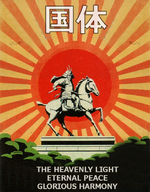
The Kalirion Fracture of Shireroth in 1671 AN was seen to many Jing politicians and people as a personal success of their Heavenly Light: not only had Chidao guarded the peace, but His Grand Secretariat had also focused its efforts in strengthening its industry. Since His predecessor, the government had increasingly pressured local gentry in abstaining from using their political power, while replacing old feudal institutions with bureaucrats of both Jing as Kildarian descent. The Empire, now more centralised than ever, had prospered under the benevolent rule, while its traditional rival was collapsing into warring states. The long term of Zhang San, who became the longest serving Diwang since Ching Fong in 1600 AN, was also understood as a sign of Heavenly approval.
Eventually recognising the need of a naval presence, the Court set out a modernization of the Tianchao Haijun in 1679 AN. The project, to replace outdated ships was set to take till 1693 AN, to avoid alarming the Raspur Pact and start a new arm race.
The empire, at peace and under a stable ruler and administration, saw its wealth, economic and industrial power rise. Good relations with its fellow Union States of the USSO further led to the intertwining with other industries. The prosperity of the population became reflected in a renewed interest in Jingdaoese culture and history among both Jing and other natives. It saw the creation of the Greater Jing School, which attempted to 'jingdaoify' the empire's cultural past. Pan-Jingdaoism also became increasingly popular, especially among the now oversea ethnic Jing groups.
The 1690 recession had severe consequences for the political theatre of the country: as a setback had led to a Bassarid retreat from a part of its oversea territories, this led to chaos on the USSO markets. Panic resulted in a collapse of smaller companies and a sharp, temporary rise in unemployment. The Chidao Emperor reacted swift and used the situation to force the most important political figure, Zhang San, to retire from office. His son and personal friend of the Emperor, Jin San, took over as Diwang.
A series of reforms was introduced: provincian assemblies were established to grant local elite a voice in government (and simultaonusly bear the burden if anything went wrong). The old guard was slowly replaced by a new, young guard of Jingdaoese who would loyally modernise both the bureaucracy and armed forces. To combat the economic unstable climate, investments in allied countries and further educational reforms were announced, as the government perceived itself lacking behind other nations scientifically.
Demographics
- See: Jingdaoese census for the latest demographic information.
Because of its location and composing a large part of the Apollonian continent, in combination with its long and turbulent history, the nation has had a very diverse demographics. When the Apollonian lands before the conquest by Kaiser Gaelen I and the establishment of the Jierdai Dynasty (with its integration into Shireroth) were very diverse and small nations, petty squabbles between them made up an important part of their time. The people had no real notion of being 'Kildarian', but shared the common view that they had some cultural ressemblences. Due to the feudal nature of the Early and Middle Jierdai Dynasty (Kildare), the realm remained fractured. Despite best efforts of its central government (first located in Diqnizhong/Blackrock Nua, later in Xiacheng/Apollo City) it took over a century for people to start identifying themselves was 'Kildari'. Even during the Great Jing, this process was never really achieved, as the descendants of Apollanteans, Dalmacijans, Blackrockians, etc., will still identify with their hometown or citizens of Jingdao, rather than as Kildari.
This division left Kildare in a vulnerable situation when the Jingdaoese started taking over the government and eventually destroyed the last remnants of the Later Jierdai. Taking up a role as mediator and keeper of the peace, wit placed itself in a very favourable power position.
This was clearly witnessed when looking to the numbers: while the Kildari still made up a majority (52,67%) in the 1670's, it was the largest minority, the Jingdaoese (21,24%), which governed the lands. In 1698 AN, the Jing made up 28,11% of the total population, while the Kildarian ethnicities were slowly losing their majority share with 'only' 50,12%.
The third largest group, the Batavians (14,03% in 1570's, while making up only 9,63% in 1698 AN), also made up a very diverse people, as they descend from several waves of immigrants: some migrated to Kildare long before the establishment of the Great Jing, others followed in later immigration waves. The first migration wave took place under the reign of the Dashi Emperor as he evacuated most of Batavia. A second, smaller wave took place during the reign of the Chidao Emperor as the Kingdom of Batavia gained independence and some groups desired to remain under His government.
The Empire witnessed a stable growth, after the Obedience Destruction, thanks to a series of programs like the Zhengbing Programme which heavily promoted the adoption and integration of foreign elements in Jingdaoese society. The relative peace and stability of the Chidao era also led to an annual population growth of around 1,5%-2% a year. This trend ceased with the 1690 recession and slowed down further growth.
Government and politics
The Chidao Emperor Imperial Household | Imperial Stewardship Teachings of the Empire
Ministries & Secretariats: Ministry of Truth | Ministry of Purity | Ministry of Stability Chao Suweiai formerly known as National Diet Defunct:
Political Factions: Guanchang | Kantai-ha (Navy) | Gunbatsu (Army) | Shanghu (Traders) Defunct: Other institutions Tianchao Chuandui | Imperial Armed Forces | Young Wandering Society | Tegong |
The Heavenly Light
- See also: Heavenly Light

The formal structure of the government centered on the Emperor as the absolute ruler of the Empire. Still, the amount of power of each Emperor depends strongly on who sits on the Heavenly Eagle Throne. There is a subtle, but very important, difference between the several Emperors who have once ruled over the country. Traditionally, the Jing refer to the mythical Ying Emperor as their founding father and first Emperor, while the Mengjiang Emperor became the first Heavenly Light.
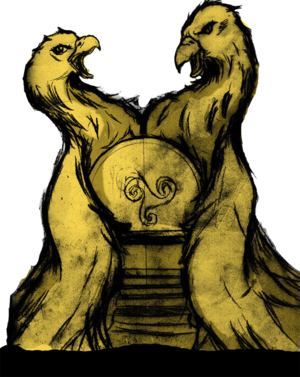
To foreigners it's sometimes hard to understand, but those who ascend the Throne will automatically be referred to as Emperor. However, only those blessed with being the reincarnation of one of the Prophets - or Sisera Herself - will hold the right to claim the title of Heavenly Light. The laws of the Empire provide no difference in privileges for both titles, but the influence the Heavenly Light has on public affairs easily beats that of a mere Emperor. The tradition in Jingdao prescribes that the Heavenly Light can easily ignore the laws and constitutions of His or Her ancestors and can even single-handedly change ancient rites. A simple Emperor also holds this power, but requires approval of priests to avoid angering the Heaven.
The story about the mythological birth of the Jingdaoese people talks about how they followed Sisera and Her descendants. With this, the role of the House of Erasmii is already strongly intertwined with the nation's own existence. Later, with the creation of the First Empire and the ascension of the Prophet Mordechai (who was posthumously named Mengjiang Emperor) to the Throne, the Erasmii formally began their leadership over the Jingdaoese successor Realms.
On certain occasions the people were not led by a member of the Erasmii Clan. Both Herman Civilis (Grand-Duke of Southbatavia), Miguel Windsor (Magister of the Church) Rollin the Conqueror and the Provisional Government of 1631 AN took up the duties to govern the country and pave the way, not as Emperors, but as a sort of temporary stewards. Herman Civilis and Rollin received the honourary title Pavers of the Way and are recognised as important historical and religious figures. The role of Yuan Windsor, who made an attempt to kidnap the Kaiming Emperor and rule the nation in his stead, is more dubious: he's seen as one who has heavily influenced both the young Emperor once He returned, as the nation's policies (as an internal weakness of disloyalty was proven, which convinced the government that there were still impure elements within its own people which had to be destroyed).
Emperors who ascend the Throne must undergo a trial of combat to proof their worth. Since the Third Empire, the Emperors descend into a labyrinth beneath the Catodral of Xiacheng, where mythical creatures lurk in the darkness. If the Emperor survives the proof and can return above the ground, He will truly hold the power which goes with His office.
Male Emperors are called with 'Ben Erasmus', while female rulers get the family name 'Bat Erasmus'. For example: Simon Ben Erasmus and Sisera Bat Erasmus. With their inauguration they also receive an Imperial name. For example, Heinrich Ben Erasmus became known as the Kattei Emperor (meaning 'Reborn').
Imperial Household
- See also: Imperial Household
Responsible for the Imperial Family, its palaces and the personal guards. Falls under the Ministry but can not be controlled by the Minister and acts independent from it.
The Head Steward, in most cases a man who has surpassed the age of sixty, is in charge of the Household. Traditionally, he's chosen among the bound servants who have served in the Imperial Administration or served at the Heavenly Palace. He's not only responsible for the day-to-day affairs, the welcoming of important diplomats, but also in organising the Private Council.
Grand Secretariat
Imperial Diwang
- See also: Diwang
The Imperial Diwang is the presiding officer of the Grand Secretariat and is directly appointed by the emperor. It is the task of the diwang to coordinate the cooperation between the various ministries. The diwang translates the instructions of the Heavenly Light to bureaucratic policy. He is also responsible for the selection of new ministers though they are formally appointed by the emperor. While the position of Imperial Diwang is often seen as one of the most prestigious positions within the empire, it is also one of the most dangerous. Several diwangs in history who thought they could make policy without consulting with the emperor have found themselves placed in front of an execution squad.
The title itself goes back to the First Empire, and was changed many times. During the First and Second Era the title had a bad ring to it, because of the traitorous acts of Yuan Windsor. Diwang Yuan lured the Kaiming Emperor into an ambush in Southern Cibola, abducted him, and tried to rule in his place, keeping the future Ci Empress hostage in her own palace. During the Third Era, the title returned to common use once more.
The Diwang's importance grew steadily after the death of the Sheng Emperor. A harsh struggle for power between the three main factions - Navy, Army and the Bureaucrats - came to an end with the Xianfa Constitution, which introduced direct Diwang Elections. The first, and at the same time last, elected Diwang was Chiang Shun. His successor, Zhang San, was once again appointed by an Emperor, as it was felt to be too dangerous to keep the government apparatus hostage by easily influential forces.
Ministry of Truth
The Ministry of Truth, often handled by the Chancellor himself, holds one of the more important Secretariats, responsible for the cultural and educational development of the people.
- Secretariat of Rites: Responsible for ceremonies and the protection of the national culture.
- Secretariat of Propaganda: Responsible for controlling the media and bring the Truth to the People.
- Secretariat of Education: Responsible for educating the masses.
- Secretariat of Censor: Responsible for censorship and re-education of delinquents.
Ministry of Purity
The Ministry of Purity pursues the financial aspects of the state, together with the appointments. It also closely checks which individuals from the outside world enter the Empire.
- Secretariat of Revenue: Financial and economical affairs.
- Secretariat of Immigration: Responsible for immigration, visa and passport application.
- Secretariat of Appointments: Responsible for the appointment of military and civil personnel.
Ministry of Stability
The Ministry of Stability (formerly known as World Peace) has as goal to handle foreign affairs, seeks to coordinate and strengthen the Armed Forces of the Empire and its States. While handling justice, the Secretariat of Hanging, is not responsible for the Tegong, as that office acts independent from the Grand Secretariat.
- Secretariat of Slaying: Handles the armed forces.
- Secretariat of Sinking: Responsible for the coordination of the State Fleets.
- Secretariat of Hanging: Brings swift justice.
- Secretariat of Talking: Handles foreign affairs.
Advisory Councils
The Jingdaoese have experimented with several forms of governance throughout the years. The Jingbuist Soviet of the First and Second Empire, consisting of one party to govern the nation, was eventually replaced by a more 'liberal' National Diet in 1632 AN. This bicameral legislature was divided into two chambers: the Imperial Yuan and the Seanad. The first one replaced an earlier predecessor, the Imperial Assembly, while the latter one revived the old Kildarian-Apollonian Seanad from the Jierdai Dynasty. This period of liberalisation was called the Minshu Period. It was eventually dissolved in a series of reactionary moves, with Heavenly Lights like the Sheng Emperor weakening its powers. The death blow followed during the Chidao Era, which ended the period of relative democratisation.
Despite the setbacks, the bicameral system still lived on in the current political system, which was established in the 1670's. The Gong Suweiai, known as Public Council, was established: nobles, public servants, important officials,... and were hand-picked by the Emperor to serve the Realm and act as representative and advisor. This made the already existing power struggle between three factions very apparent: both the Guachang (Bureaucrats), Kantai-ha (Navy) and Gunbatsu (Army) were openly trying to gain favour from the Heavenly Court.
Real power, however, resided within the Private Council, known as Sifang Suweiai. While holding no formal power, it was composed of the most important and influential people from the Realm. From the shadows it governed the nation with an iron fist and influenced the Grand Secretariat day-to-day affairs and interferes in its decision making. Titles of documents in the Council were made viewable for the public, and for that reason were often made misleading on purpose.
Grandsire
The title of Grandsire was once used by the prime minister of the Princes of Aryasht. During the era of the Apollonian Republic it was the title of the president of the Provincial Assembly. Afterwards it was adopted by the Jingdaoese as a title granted by the Emperor as one of the highest honours that a person could receive. The person owning this title acted as vice-president during meetings of the Clans in case of the the Heavenly Light's absence.
Nowadays the title is still sometimes used to refer to the First Prince or Princess, who is most likely to ascend the Throne.
Administrative Subdivisions
The Jing Dynasty reached its largest extent on the Apollonian mainland during the second half of 17th century (Norton Calendar), when it ruled the so-called Fourteen Provinces. The Empire once connected the western coast of the continent with the east coast, claiming most of what once had been Antican territory. The Destruction by the Obedience Machine in 1631 AN ended the Emperor's (loose) reign over the tribal communities and forced the government to focus on its older core lands.
The loss of the provinces in the east were used as an opportunity by the Zettai Emperor to promote colonisation of the lands north of Xianbei Province. Between 1631 and 1634 AN large groups of Batavian emigrants from the Benacian continent sought a new and better life in the Jinkeai Province, which got the name New Batavia.
1642 saw the annexation of the Xianxia Province (then Shenxianxia), or the Sheng Frontiers, and the Julang Province during the reign of the Sheng Emperor. It became the home of banished criminals, adventurers and re-education camps. The Julang Province would later be lost, as the Mingshi Emperor used the funds of its administration and defences to fund the creation of an oversea religious colony (of which Shenximeng, or St. Simon) remains a remnant. From the ashes of this territory, the Florian Republic and the Hondonese Empire grew.
Lanuria was annexed to protect its northern shipping lanes right before the outbreak of the War of Lost Brothers, and the Chidao Emperor successfully pushed eastwards, adding the tribes of the Mengtian Province to its core lands.
The Jingdaoese Empire was strongly centralised, demanding that governors and governor-generals ruled their respective territories from the capital of Daocheng itself. This rule to avoid that a governor would rebel, as he and his family were safely watched within the perimeters of the Imperial Capital, at the same time weakened the effectiveness of the regions. The oversea territories, with their distinct cultures and habits, benefited from rulers who knew their local practises. Jingdaoese governors had, however, little time to get used to them before getting recalled to the capital.
Therefore, the Empire was divided into Jingdao Proper (or better known as the Fourteen Provinces), which kept their Provinces and Districts. The Apollonian islands east of Liao Province, with important religious and cultural importance to the Jing, became known as the Three Far Eastern Territories. Other oversea territories received the blessing of the Court to experiment with their local government. Those regions received sufficient autonomy to act more or less independent towards the Empire, in return for trade advantages, taxes,... which directly went into the Court's treasury.
Foreign Relations and Military
Foreign policy
- Read more about the foreign affairs and stance of affairs with other nations: Imperial Tributary System
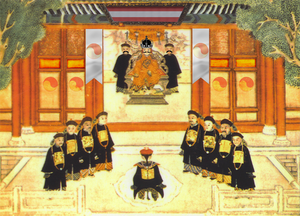
"The Jingdaoese People is a Race of Travellers: they spread across this world in an eager search for Purity. Born from the ashes of the ancient world under the Ying Emperor, when men dwelt into caves and marshes; having fought for liberty under the Mengjiang, when we acted as mere servants of the Batavii Tribes; challenging Fate by taking the Power that rightfully belonged to Us under the guidance of the Duchang and - eventually - finding our current homestead under the Haigui. Our history is long and ancient, just like its People. We are are never truly bound to the lands we were born as we follow our Heavenly Light. Nonetheless, we aren't a people who want to be bullied by the big boys. Alexandria blamed us for their own greed, Stormark blamed us for their own decadence, Shireroth blamed us for their own dissension and corruption. We merely show them the ugly truths, and therefore we were often despised by their ruling classes. Apollonia must therefore remain a beacon of hope, and not the plaything of those imperialists. Stable nations on Micras, befriended and in harmony with the Jingdaoese Realm: that's what we seek."—Xa Tang, 'Letter from an Envoy to the Meiyo Emperor', 1658 AN
Foreign contacts between Jingdao and other nations has, throughout its long history, held mixed results. Since its establishment, the Jingdaoese people have seen themselves blessed (or cursed, according to some heretics) with the divine duty to unite Micras under their Heavenly Banner and spread the enlightenment of the Catologian Faith to all corners of the world. This brought the First Empire (located on Cibola) in a direct conflict with the Alexandrians (which was called Purple Horde) when they decided to close the Strait of Barbary for any foreign shipment if no heavy tax was paid.
Later on, during the Jierdai Dynasty, the Jingdaoese were actively involved in assisting the Myksos Dynasty in Kildare (back then a part of Shireroth). With the help of the Tegong the feudal Kildarian society was slowly transformed into a more centralist (but still very backward) state. The Mango Throne saw begrudgingly how their eastern Duchy became more and more dependant on the Jingdaoese expertise and aid, after which it took countermeasures. When the Jierdai Dynasty wanted to join the military pact, the League of Nations for the Advancement of Purity, the Shirerithian government interfered. Some Tegong officers within Kildare were deported, but the organisation remained active behind the scenes. Secretly awaiting the right moment to strike and declare the Jierdai's independence from Shirekeep.
During the Kildarian Revolution of 1617 there was no official support from Jingdao for the independence of Kildare (which would become the Apollonian Republic of Shireroth's East) , but it was blamed to have had a hand in it. This eventually seemed to have a ring of truth in it, as the Republic was annexed by the Haigui Emperor and the Empire of the Great Jing was proclaimed.
Diplomatic history of Jingdao has therefore always been one of indirect conflict and a certain distrust towards (and from) the great powers of Micras. It shaped the policy of self-reliance and dominance. Throughout the years, it tried to keep peaceful relationships with its neighbours and expand its sphere of influence. This led to the Apollonia Doctrine, which pushed for the establishment of the Blackrock Pact, in 1636 AN. Gerenia, the Brettish Isles, Calbion and Jingdao formed, together, a military organisation to support each other in the wars to come. Ultimately, the cooperation was never really close, with some officers and diplomats blaming its flaws on the Jingdaoese diplomatic model (which often viewed other nations as lesser partners, instead of equals). The Pact ultimately failed and was quietly disbanded.
Despite setbacks, under the reign of the Mingshi Emperor Jingdao joined a closer union, the Union of States around the Sovereign Oceans, with Passio-Corum, Gerenia, Craitland and Xang Muang. This organisation was not only a military one, but also placed heavy focus on economical and cultural cooperation and development.
The Jingdaoese use the words Xing and Hun in the diplomatic theatre: Xing are nations pure enough to cooperate with, while Hun nations are seen as barbarian and potential enemies. A separate status, Chu, was used for those it perceived as neutral states.
Traditionally, diplomatic contacts were made by paying tribute to the Heavenly Light. This popular custom, mainly in use during the early days of the Great Jing, is still practised occasionally, but to a lesser extent and mostly symbolic as a sign of goodwill towards the Heavenly Court.
Military Branches
The military of the Empire could be divided in two more or less independent main branches: the land and naval forces. While the supreme commander of those forces is the Heavenly Light (for the land forces He holds the title of Caudillo, a remnant from merging the Jingdaoese troops with the old Apollonian Army), real command lies in the hands of Generals and the Ministry of Stability.
Between 1631 and 1636 AN the States which made up the Empire received the liberty to built and expand their own military force. Immediately, a naval expansion began between the States, as global threat was mainly coming from oversea empires. With the end of the States and re-centralisation, the naval armament stayed an important issue to the military budget.
The main branches are divided in several minor branches:
| Name | Direct allegiance | Soldiers | Description |
|---|---|---|---|
| Tianchao Chuandui (Imperial Jingdaoese Navy) | Ministry of Stability | 351,045 active duty personnel |
|
| Imperial Armed Forces | Ministry of Stability | 978,248 active duty personnel |
|
| Young Wandering Society | Ministry of Stability | 28,090,000 | The youth association is responsible for the indoctrination of Jingdaoese youth. Teaching the basic principles of warfare, adoration of the Heavenly Light and preparing children for their place in society is taught in the Young Wandering Society. |
| Tegong | Neiwufu Agency | ~120,000 | Intelligence and obedience service, aided by a network of civil informants. |
| Imperial Kadetten | Neiwufu Agency | ~42,000 | Young cadets, trained to serve in the Armed Forces as officer. Can be called to serve during crises. |
| Imperial Jingdaoese Air Force | Neiwufu Agency | ~22,000 | Overshadowed by the air forces of the Navy and Army. Mostly responsible for transporting troops and training personnel. |
| Imperial General Headquarters | Ministry of Stability | ~6,000 | Responsible for the continuous study of all aspects of war, and for drawing up and reviewing plans for mobilization or campaign during peace time. It consists of the higher ups of both the Army as Navy and is responsible for coordinating war efforts during war time. |
| Grand Holy Order of the Temple of Cato | Monastic Order | 5,000 | Monastic Order founded to preserve and defend the Catologian Faith. |
| Mofaqishi (Magical Knights) | Catodral of Xiacheng | 300 | Ceremonial guard dating back to the earliest days of the Jierdai Dynasty, guarding the Catodral of Xiacheng (also known as the Red Catodral). Original headquarters were located at the monastery of Mons Clistiro. |
Civil service
Young Jingdaoese children learn to love and protect their home from the very beginning. Becoming a good citizen means serving the country and its military with any means possible. To prepare them for a potentially harsh life they are strongly advised and pressured into joining the Young Wandering Society, a youth association. Not only war games, but also survival games and reconstruction is thought to them from a young age.
Those who, according to the supervisors, have the capability to become fine officers, are sent to the military academies across the country to become Imperial Kadetten. The most promising (or influential ones) end up in Blackrock Military Academy, the most prestigious military institution, which founding dates back to the independent Republic of Blackrock and is located in Diqnizhong (during the Jierdai Dynasty known as Blackrock Nua) in the west of the Zhou of Heliu.
Jingdaoese are conscripted in the armed forces when they reach the age of 18, but thanks to the large number of volunteers, those obligations are never truly enforced. Non-Jingdaoese ethnicities are de facto free to chose to serve or not, but discrimination on the labour market is far spread. Therefore, it's a very common practice among almost all minorities to join either the Armed Forces, Navy or some other kind of national service. As ethnic Jing are most likely to have joined military academies at a young age, the officer numbers among non-Jing are relatively lower.
Those who decide not to join the Army or Navy are expected to serve in other branches: becoming youth leader to guide the younger Jingdaoese citizens, or actively aid in the development of the nation (by helping with construction works, for example). While claimed to aid the nation's development, it's also universally accepted as a way for the government to bring the diverse population groups closer together.
Culture
National Symbols
Music
Religion
For most of Jingdao's long history - from a Greater Jing School perspective of view - the people professed the Soloralist faith. It is said that the faith predates the mythological foundation of the Empire and can even be traced back to the earliest days of the Empire of the Glorious Sun. This seems untrue, as most experts tend to belief that the faith came into existence on the islands of Jasonia. This strengthened the claim of others that the rise of the Soloralists - seen by some present-day experts as a disruptive influence - became the downfall of the Empire of the Glorious Sun, as religious strife could have eroded the power base of the ancient emperors.
Eventually, the Ying Emperor, the mythological founder of the Zuxiang Dynasty and Jingdao, was seen as a living god who united the tribes of the lands. From Xiacheng he ruled with a fair but harsh hand and took control over the Apollonian lands. After his death, the tribes he had bound to his Throne would start to travel across the world. Through trade and migration, Soloralism influenced Benacian and Apollonian societies.
Soloralism retained its position of importance during the Wangzi Dynasty (265 - 987 AN), with several princes who were fighting each other for hegemony and a weakend imperial court, abusing its dogma's to receive support of the population.
During the Youya Dynasty (987 - 1451 AN) squabbling warlords, kings and self-proclaimed emperors fought over the lands. Not much changed, but splits into several sects became more apparent. The spread of Cedrism and other religious cults created a more open attitude towards non-Soloralists and allowed for a more open world view. During this period, faith took a backseat and lost influence on government affairs.
The subjugation of the region by Kaiser Gaelen I of Shireroth and the establishment of the Jierdai Dynasty led to a sharp rise of Cedrists among the population. Mass conversions followed suit, not always sanctioned by Shirekeep but enforced by local nobility who hoped to get in good graces with their new overlords. Overeager zealots from both side increasingly came into conflict with each other. The situation deteriorated further, until Kaiser Meskan I reconfirmed the region's religious freedom in 1584 AN.
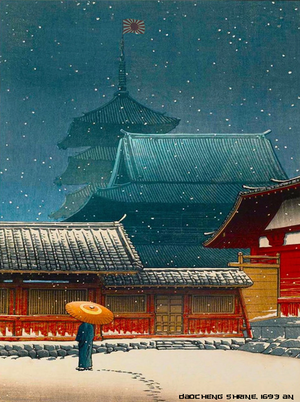
During the Middle Jierdai Dynasty (1533 - 1604 AN) religious peace slowly returned. The Dutches (Dukes) of Jierdai enjoyed a period of increased liberty from central authorities and spread their wings. A renaissance of old Apollonian culture, including Soloralism, happened and the popularity of the Cedrist god Sakat grew among the scholars and elite. A mixture of Soloralist and Cedrist views and traditions became more common.
During this relatively prosperous era, Batavian immigrants (later followed by South Batavians) arrived and brought with them their own faith: Catologism. The religion adapted rather quickly, adopting central tenets of the other faiths. It slowly but steadily started to overtake Cedrism and Soloralism as largest religion.

During the Late Jierdai (1604 - 1623), the number of vicious persecutions and purges by the House of Myksos against Soloralists and Cedrists increased. Soloralist temples (of which many had already been fallen in disarray) were placed under the management of the Catologian Church. The Imperial Catodral of Xiacheng, originally a temple, was re-established as catodral and its walls painted red (according to legend with the blood of Soloralists who had disobeyed the emperors decrees).
During the Revolution of 1617 the Catologian Church saw its own power limited. Groups of dissatisfied people saw in it a way of oppression of the people and in several cities throughout the new Republic people attacked churches and temples. Some of them were burned down, but most possessions were confiscated by the new republican government and the profits were used to pay for the massive modernisation attempts of the armed forces.
With the establishment of the Great Jing, secularisation came to abrupt halt. While Great Jing rulers were relatively open towards other faiths (at least in this early period), there were aggressive campaigns to convert the population to the Jingdaoese version of Catologism.
The Heavenly Light was seen as the sole representative of the Gods on Micras and should therefore be worshipped. This paved the way for the government policy of Tianchaodao (The Way of the Empire) in 1642 AN, which taught that complete submission to the divine Heavenly Light is the only road to salvation and the only way to server the Gods. Tianchaodao became the sole recognised and most widespread practised religion in the country. It's often seen as a way to unite the many ethnic groups under the same banner.
From the 1670's and onwards, Chidaoism rose to prominence. Despite its several branches, they all have a core belief in common: the Chidao Emperor stands above the other gods. As long as the is alive, the Emperor needs to be obeyed and worshipped to please the other gods. In case the Emperor would die, it is assumed that his presence in the Afterlife will replace all gods and He will take on the role as supreme and all knowing deity. Therefore, theologists claim that Chidaoism is monotheistic, despite its polytheistic origin.
Education
- See also: Education in Jingdao

Education is an important part of Jingdaoese society and even mentioned as one of the Five Principles of Jingbuism. The focus lies on raising the youth as as useful citizens for the empire. All students are therefore expected to be able to find employment after they finish their studies and to be able to serve as soldier in the Jingdaoese armed forces, or serve in a function which could aid the military in one way or another.
It is obligated to go to school from four till at least eighteen year. No child is allowed to have private schooling, as it is viewed as anti-social and not patriotic (school activities are after all meant to strengthen the unity between the pupils).
The principal educational emphasis lies on the great importance of traditional national political values, worship of the emperor, reading, writing and arithmetic. The education system promotes traditional Jingdaoese values in the hierarchical nature of human relations, with the State and its Government superior to the individual, and the Emperor superior to the State. The educational system is used for supporting the militarized state and preparing future soldiers.
The government publishes official text books for all levels of student, and reinforce that with cultural activities and seminars. Children who don't perform in those activities are frowned upon by both teachers and pupils. The pupils who, at the age of 14, show much promise are sent to special military Imperial Kadetten schools to be educated to become officer.
Apart from indoctrination in nationalism and religion, children and school students receive military drills (survival, first aid). These are taken further by the Young Wandering Society. College students are trained for home defence and regular military units. Young women are seen as equals of the guys. Both receive first aid training.
Sports
Industrial power
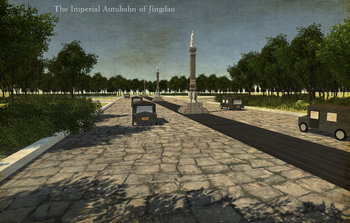
The economy of the Empire has been very diverse, thanks to its large size and extending from mountain ranges to valleys and from lakes to seas. The Antya region (the Zhou of Zhongji and Heliu) has since the ancient days hold a monopoly on the production and distribution of excellent wine (Antyan wine). The Vervoll Region (west Heliu and South East Qaoshan) is responsible for most of its wood and other natural resources which can be found in its vast forests, while the Dalmacijan Region (Bangou and Qianjin) is famous for its mines, both gold and iron are present in the soil in large quantities.
the Zhou of Jinkeai inherited large industrial complexes and a huge labour pool. Together with the Norfolk Isles, they are the main distributor of vessels and other military materials, thanks to companies like Sokoku Industries (formerly known as Heimat Industries). The Norfolkian city Acadeimos became a major player in the chemical industry thanks to the state funded Chemical Research Facility [3].
Visitors to Jingdao will notice that local currencies can differ from Province to Province, or even from County to County. While there is only one national currency, the Kala, which was adopted by the government from the Apollonian-Kildarian administration instead of using the original Frank (a Southbatavian currency), it is not uncommon to see people trade - mostly in remote villages - with other means. However, this practice is slowly disappearing.
Trade contacts were limited before the establishment of the USSO Common Market, as only a few ports were open to the outside world. The Maritime Apollonian Customs Service had the responsibility to protect the economy from an overdose of foreign products and acted as a watchdog, until this task was taken over by the Haijing, a coast guard without regional differences. The City of Tyrenia, Port Nevermore and Apollo City are the three largest trade ports.
National policies from the Grand Secretariat tend to focus on the expansion of the war industry, rather than supporting the luxury goods sector. The Jingdaoese Common Market represents the Empire and its most important companies on the USSO Common Market.





